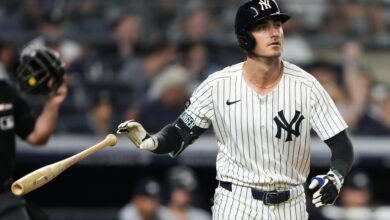Will Cubs Turn To Trade Market If Lester Bid Fails?
When the Cubs entered this offseason, they were talking big. The front office spoke of adding impact pitching from outside the organization.
They set their sights on the top free agent hurler, Jon Lester, and recently made their pitch. There were even some previous pie-in-the-sky reports that Theo Epstein and Jed Hoyer were going to get not one, but two top free agent arms.
I wondered aloud if the front office was possibly setting itself up, or getting set up, for some public disappointment. It is still way early in the offseason process, but after (understandably) missing out on Russell Martin, there have been some audible groans on Twitter that the Cubs will have to re-adjust their offseason goals.
I’m not in that camp though.
Lester is the free agent pitching target the front office sees as a multifaceted gem for this organization as it moves back into relevancy. There are varying reports as to whether the Cubs can land their man. Yet, even if the Cubs indeed end up missing out on Lester, I do not see them going overboard for the 33-year-old James Shields. I’ve also heard on many occasions they aren’t in on Max Scherzer.
So everyone will then point to next year’s free-agent class that is chock full of top-of-the-rotation performers. David Price, Jordan Zimmermann, Johnny Cueto, Mat Latos, Doug Fister, Jeff Samardzija, Rick Porcello, the list goes on. The Cubs have been linked to many of those arms, namely Price and Zimmermann.
The rub: there is danger in living in the free-agent future. There could be injuries, extensions, or even a trade to a team that can lock one of these guys up. All loom as real possibilities to counter wishful thinking.
Furthermore, there will be even more and louder groans about the Cubs missing out once again in their pursuit of a big pitcher. First it was Anibal Sanchez, then Masahiro Tanaka; if they miss out on Lester, why would they land someone next year?
The Cubs want to spend this offseason but they will likely have other options. Will they turn to the trade market? Theo Epstein tells Patrick Mooney it can be every bit as big a gamble with trades as it is with free agency.
“It depends on how much money you have and how many prospects you have,” Epstein said with a laugh. “I think you can make mistakes with both.”
Maybe the Phillies become reasonable in their asking price for Cole Hamels. Maybe Jordan Zimmermann decides he wants to pitch in Chicago and agrees to a pre-arranged extension in a trade. Zimmermann’s name was bandied about again yesterday as being available. We do know Washington wants to engage the Cubs to relieve them of their glut of shortstops. Would a Starlin Castro/Zimmermann deal make sense if the Cubs can’t lock Lester up?
Castro has been mentioned before in a possible deal centered around a young pitcher like the Mets’ Zach Wheeler. The Tommy La Stella deal gave the Cubs even more flexibility to make dealing from a positional strength a real possibility. Wheeler, coupled with a Brandon McCarthy-type signing, could set up the rotation nicely until they can land that ace in the “next 15 months,” as Epstein has alluded to on multiple occasions.
Despite the talk from the front office about winning the division next year, and Joe Maddon uttering the words “World Series,” most industry and media experts see the Cubs potentially crossing the .500 threshold as a more attainable reality for 2015. Therefore, Epstein has said he wouldn’t have to sell out this winter, and that’s absolutely true. He still sounds very reluctant to give up any of his prized farmhands, but also realizes it may happen at some point.
“It seems more palatable to just say: ‘Hey, let’s just go the extra year on a free-agent contract,’” Epstein said. “Because the potential burn factor is four years down the line, five years down the line. Whereas the prospect, there’s an emotional connection to him. He’s tangible. He’s right here. You’ve just seen him play. You know how talented he is.”
“But in the long run, as we all know, not all prospects work out. And usually you don’t like that extra year that you gave the free agent. Those chickens always come home to roost.”
“Teams get burned just as often by not giving up their best prospects as they do by putting them into deals, because not all prospects work out,” Epstein said. “So it just underscores how important it is to scout your own players the right way (and) to maintain some sense of discipline in free agency, if at all possible.”
The Cubs have invested wisely in order to be in the position to be smart buyers when the time is right.
The only question…what currency will be spent?

